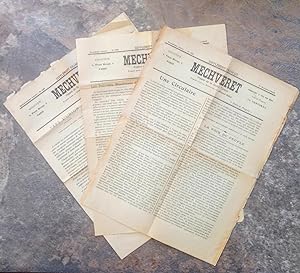Beschreibung
Original journals. Folio. (32 x 25 cm). In French. 3 issues: (4 p.; 4 p.; 8 p.). Ahmet Riza Bey was an Ottoman-born Turkish political activist, scientist, statesman, educational reformer and a prominent member of the Young Turks, during the Second Constitutional Era of the Ottoman Empire. In 1908 he became the first President of the revived Chamber of Deputies, the lower house of the Ottoman Parliament, and in 1912, he was appointed as the President of the Senate (the upper house) as well. He also served as Minister of Education from the Liberal Union party, the main opposition party to the ruling Committee of Union and Progress. In 1908, his name was among the candidates' list for the next Grand Vizier. He was the leading negotiator during the failed agreement of coalition between the Ottoman Empire, France, and Britain for World War I. Ahmet Riza has been described as a polymath by some authors. He was born in Istanbul in 1858, the son of Ali Riza Bey. His father was nicknamed Ingiliz ("Englishman") because of his command of the English language and admiration of the British Empire. His mother, Fraulein Turban, was born in Munich but was of Hungarian origin. She moved to Vienna, where she met Ingiliz, and converted to Islam to marry him, taking the name Naile Sabika Hanim. He graduated from Galatasaray High School in Istanbul and subsequently studied agriculture in France. As a young man, he sought to improve the condition of the peasantry in the Empire. He was concerned with the conditions of the farmers and wanted to implement agricultural methods, supporting the ideas of the French sociologist, Auguste Comte. In 1894, he published a series of publications on unification of Islamic and Ottoman traditions of consultation. In 1895, Mesveret (Meshveret, or, Mechveret), the journal that he published, became a locus of the exiled Young Turks movement. Ahmet Riza opposed the maverick Prince Sabahaddin's calls for revolution and European intervention in the empire at the 1902 Congress of Ottoman Opposition in Paris. According to a customized book in 1889, on the pretext of participating in the exhibition organized for the centenary of the French Revolution, there was a customized letter, which indicated he escaped to Paris and did not return. He became an interpreter as he learned French. At the University of Paris, he continued his lectures on positivism, taught by mathematician Pierre Laffitte, as he was influenced by Laffitte's thoughts about Islam and Eastern civilization in particular. Laffitte believed that Islam was the most advanced religion, so it was easy for Muslims to pass through positivism. Ahmet R?za became one of the most active members of the Société Positiviste (Positivist Society), and since 1905 he has appeared as a "representative of Muslim communities" in the Comité Positif Occidental, establishing the spread of positivist international platitudes. During his first years in Paris, he attempted to respond to various newspapers and magazines, which were writing unfavourably about the Ottoman Empire. In 1891, he wrote a letter to the postal and telegraph chronicle in Istanbul as he did not obey the instructions of the center of Paris to return to his country due to his use of the expression "liberty" in a lecture on Ottoman women and stated that he did not belong to any secret cemetery. Ahmet Riza sent his thoughts to Sultan Abdul Hamid II in 1893. He continued to send sheets upon the request of his encouraging response and continuation; he tried to convince him that the constitutional regime was not a bad thing. In the case of sending the sixth party, he began to write political writings in French, which was published by the former Syrian deputy Halil Ganem. (Source: Wikipedia).
Bestandsnummer des Verkäufers 052317
Verkäufer kontaktieren
Diesen Artikel melden
